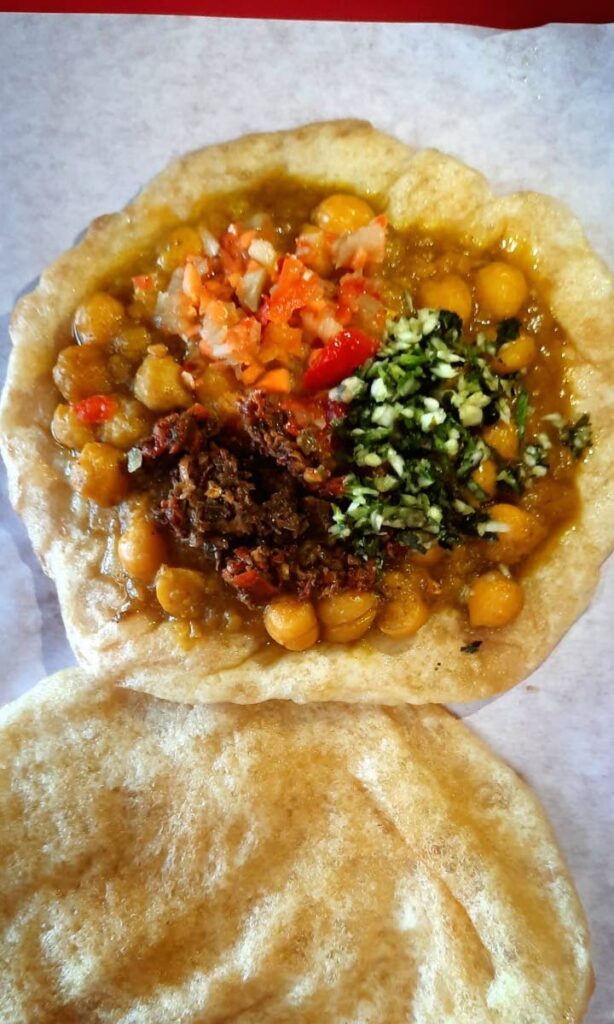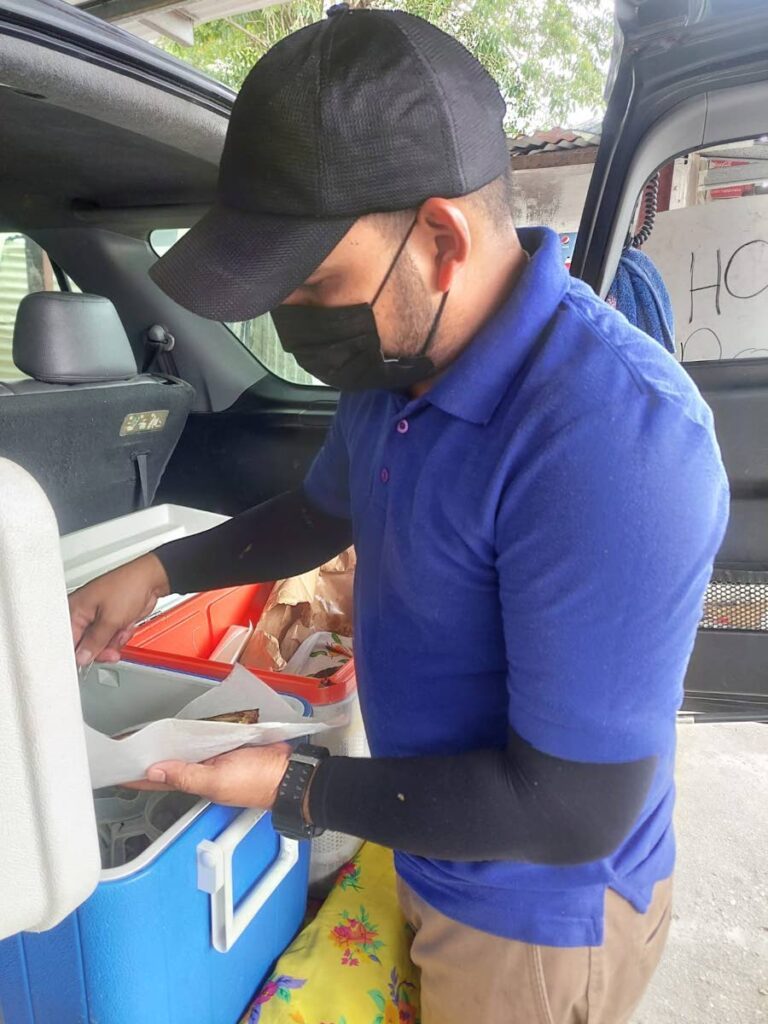Doubles – Tale of tradition, transformation

BAVINA SOOKDEO
Doubles has become a national dish in Trinidad and Tobago. This iconic street food has a rich history rooted in cultural heritage and family tradition.
Doubles consist of curried chickpeas (channa) sandwiched between two pieces of fried dough called bara.
It owes much of its legacy to pioneering families like the Deens and Alis.
Wazim Ali, a third-generation doubles vendor, continues his storied tradition with Ali’s Doubles, in Vistabella, San Fernando.
Through dedication and adaptation, he continues to honour his family’s tradition while navigating the challenges of modern business.
He related the history of doubles in Trinidad and Tobago to Business Day, beginning with Mamoo Deen and his wife Rasulan, who started producing channa and bara in 1936. Ali’s grandfather, Asgar Ali, in 1938 joined his brother-in-law (Mamoo Deen) in this venture.
"My grandfather moved to San Fernando from Fairfield in Princes Town, and that’s where Ali & Sons Bara and Channa eventually became Ali’s Doubles," Ali said.
In those early days, the process was labour-intensive.

"Preparations started at 4 am with lighting firewood, boiling channa and frying bara in hot coconut oil,” Ali explained.
Since taking over the business in 2020, the young Ali has introduced some changes, while preserving traditional methods.
"We had to adapt due to covid19, shifting to strictly takeaway services,” he said.
Despite modern conveniences like gas stoves and dough mixers, much of the preparation remains hands-on, maintaining the authenticity of the product.
A typical day at Ali’s Doubles starts at 3 am.
"We light up the channa, knead the flour, and fry the bara. By 7 am, we’re open, and usually sell out by 10.30 am."
This rigorous schedule, he pointed out, ensures the doubles maintain their high quality and unique flavour.
Running a doubles business is not without its challenges. The rising costs of flour, channa and oil have forced price adjustments.

"We’ve had to increase our prices due to significant hikes in flour and other ingredients," Ali said. "Flour prices have made us move from $5 to $6. The increase from $60 to $90 in flour was the biggest factor in addition to increasing channa, oil and packaging costs. Channa fluctuates a couple times a year – between $300 to $550 a bag. Oil prices have settled at $220, up from $170."
Additionally, crime has necessitated increased security measures, including cameras and panic buttons, as a result of robberies.
Despite these challenges, Ali remains optimistic about the future. He sees the commercialisation of doubles as a positive development.
"Imagine walking into a supermarket and picking up a pack of ready-made doubles. I hope to do this one day, if not here, in the Caribbean also. Jamaica and Guyana are good markets,” he envisioned.

He says Ali’s Doubles stands out due to the meticulous preparation and consistent quality. This commitment to quality has earned it a loyal customer base, including Indian expatriates who find the taste reminiscent of their Channa Bathura or Puri back home.
Innovations like chicken and shrimp doubles (which started in 1995), along with unique sauces such as pineapple chutney and amchar pepper, have also set Ali’s Doubles apart.
"We even offer what we call piña colada doubles – pineapple chutney paired with a coconut chutney."
There's also a packaging service for customers who want to take doubles to their loved ones abroad.
Ali acknowledges the uncertainties of the future, particularly with potential increases in doubles prices.
"People want doubles, but some may not afford them at $7-$8. We have to see how things go in the next five years," he contemplated.
Doubles prices over the decades:
Ali reported that doubles prices from 1938-2022 were:
1938 – $0.02
1943 – $0.04
1948 – $0.06
1957 – $0.05, $0.08, $0.10, $0.12, $0.15, $0.20, $0.25, $0.30
1973 – $0.35, $0.40, $0.50, $0.60, $0.75
1980 – $1, $1.25, $1.50, $1.75
1999 – $2
2001 – $2.25
2003 – $2.50
2005 – $2.75
2007 – $3
2009 – $3.25
2011 – $3.50
2013 – $3.75
2015 – $4
2017 – $5
2022 – $6
Om Kar Doubles and Pies is also a testament to the enduring legacy of family tradition and dedication.
"Our business is an inheritance from our grandparents on our father’s side. They were in operation for approximately 20 years. We took over in 1991 and started selling doubles for only $1.50," said Sanjay Yankatasu, the owner.
The enterprise began with his grandfather, uncles, and his father, who rode bicycles throughout Bamboo Settlement 1, 2, and 3.
Today, the business is run from one spot, opposite the St Joseph Health Centre, Mt Hope, where it has been a staple for over 30 years.
Since taking over the business, Yankatasu and his family have made several strategic changes to stay competitive and cater to a diverse customer base.
"We added a variety of other delicacies such as aloo pies, saheena, kachori, bhaiganee, and pholourie," he said. They also introduced a range of condiments, including pepper sauce, chadon beni sauce, sweet sauce, cucumbers, roasted pepper anchar, and more. This wider array of options has attracted more customers and increased their market presence.
Despite incorporating some modern tools, such as electric blenders, the business largely adheres to traditional preparation methods.
This commitment to tradition, Yankatasu explained, ensures the authenticity and quality of their doubles, factors their loyal customers deeply appreciate.
The daily routine at Om Kar Doubles and Pies is a blend of tradition and efficiency. Preparation starts the night before, with soaking channa, dhal and peeling potatoes.
"We begin our routine at 5 am, where bara is placed on our table for frying, boiling channa and potatoes, grinding dhal, preparing seasoning and condiments," Yankatasu said.
By 11 am, they set up at their business location and are typically sold out by 2 pm from Monday to Friday.
Yankatasu also faces various challenges in his role as a doubles vendor. Crime and fluctuating costs of raw materials have affected operations.
"Crime has affected our business in that when it gets lonely, we pack up and go. Also, fear of extortion is always there," he added.
Additionally, the rising cost of ingredients like flour, channa, and seasoning has forced them to carefully manage their pricing and operations.
Despite these hurdles, Yankatasu remains resilient and focused on providing value to his customers.
Om Kar Doubles and Pies prides itself on its originality and customer service.
“Our doubles, as stated by most of our customers, bring back the ‘old-time-day taste.’ We keep it original, no variations,” Yankatasu said. He also offers free delivery within the Mt Hope Hospital compound, which has helped grow his clientele.
According to Yankatasu, the special blend of masala, spices and seasoning sets his doubles apart, making it a favourite among locals.
Looking ahead, Yankatasu envisions expanding the business once economic conditions improve.
"We plan to expand in the near future, but as of now, we are trying to maintain a steady flow. Once the economic atmosphere changes for the better, we plan to expand by doing ‘hot on d spot’ doubles for longer hours.”
This expansion will allow him to serve more customers.


Comments
"Doubles – Tale of tradition, transformation"